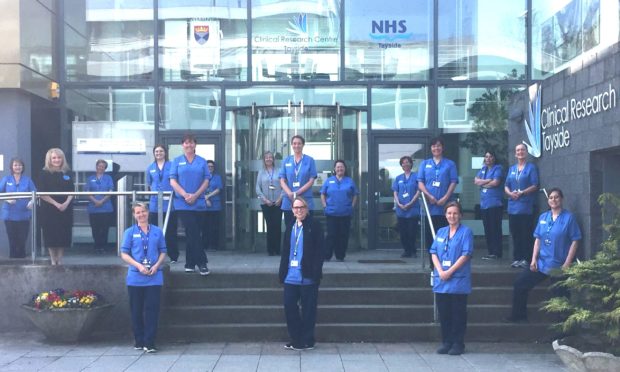Researchers, based at the Clinical Research Centre at Ninewells, a joint NHS Tayside and Dundee University facility, are recruiting patients to COVID-19 research studies to help better understand and treat the disease.
Patients from Tayside are taking part in a number of clinical trials which are now underway in Tayside with further research studies planned. The results will be used to help inform treatment decisions and benefit patients in the immediate future.
The clinical research nursing team works closely with the clinical teams in the COVID wards, recruiting patients to the trials and supporting delivery of the studies.
Professor Jacob George, Director of Research and Development for NHS Tayside said, “It is crucial that patients have the opportunity to participate in these clinical trials in order to help scientists and clinicians find effective treatments for this devastating pandemic. “We are grateful to patients and their families who are helping us with this. Clinical research in the NHS in partnership with our patients helps place the UK as a global leader at the forefront of the COVID-19 battle.”
Clinical trials ongoing in Tayside:
- RECOVERY is a national clinical trial for hospitalised COVID-19 patients led by the University of Oxford. There are 29 patient participants in Tayside thanks to the efforts of clinical research nurses provided by Clinical Research Centre (CRC) at Ninewells Hospital. The study is being led locally by Professor James Chalmers, Consultant and Professor of Respiratory Research, Scottish Centre for Respiratory Research, Ninewells Hospital.
The RECOVERY Trial aims to establish the effectiveness of potential treatments by comparing usual care only, to usual care in combination with a number of potential treatments. The team will constantly review information on new drugs and include promising ones in the trial.
- The University of Liverpool in collaboration with University of Edinburgh is running ISARIC UK Clinical Characterisation Protocol for COVID-19. The study has so far collected data on 73 patients and is led locally by Dr Nikolas Rae, Consultant in Infectious Diseases, Infection and Immunodeficiency Unit, Ninewells Hospital.
The ISARIC study aims to answer many urgent questions about the virus in real time. The study will recruit at least 1,300 UK patients over the next year and has already started publishing clinical data reports nationally on its findings.
- Genetics of Mortality in Critical Care (GenOMICC) is led by the University of Edinburgh. The study has recruited nine patients in critical care and is being led locally by Dr Stephen Cole, Consultant in Anaesthesia and Intensive Care Medicine, Ninewells Hospital.
GenOMICC is an open-source research study that aims to understand the genetic factors relating to outcomes in critical illness. Susceptibility to COVID-19 is likely to be, in part, genetic. GenOMICC is looking to find the genes that cause susceptibility, which may help us to prioritise treatments to respond to the global crisis.
• STOP-COVID (Superiority Trial Of Protease inhibition in COVID-19) is the first Scottish-led multi-centre placebo-controlled randomised drug trial evaluating Brensocatib, an oral medication that has shown to reduce lung damage by inhibiting enzymes that destroy lung tissue. STOP-COVID has been prioritised by the NIHR as an Urgent Public Health (UPH) Study and is aiming to recruit 300 predominantly Scottish patients hospitalised with COVID-19. It is led by Professor James Chalmers, University of Dundee.
Picture of Clinical Research Centre nurses courtesy of NHS Tayside
